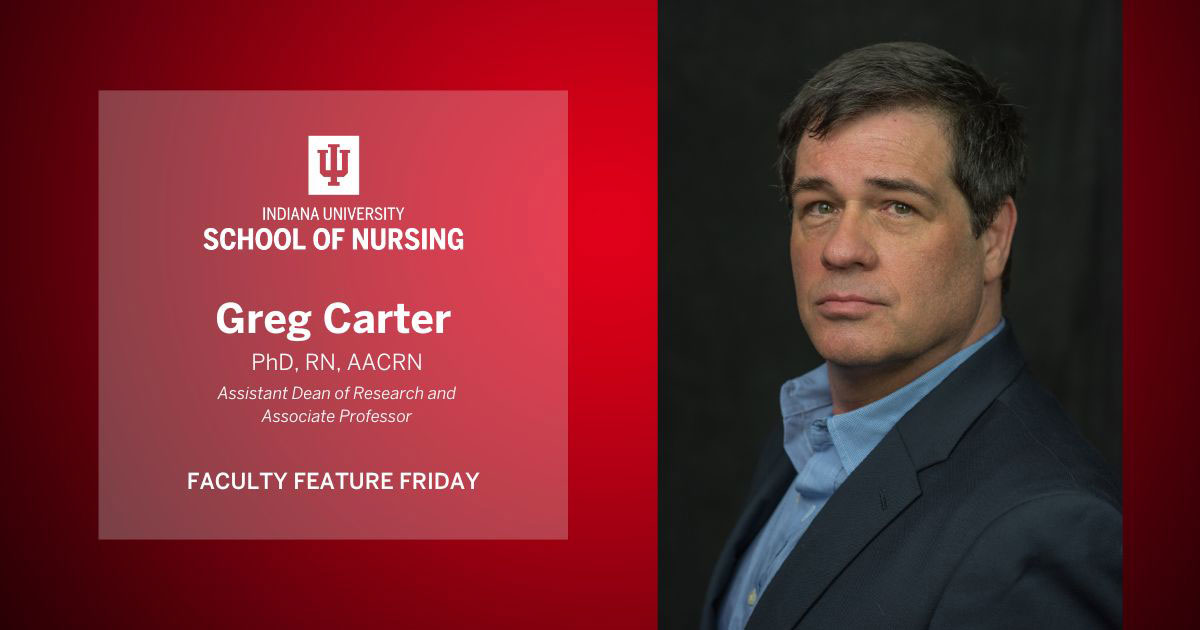Meet Greg Carter, PhD, RN, AACRN, Assistant Dean of Research, and an associate professor at the IU School of Nursing. Dr. Carter's research focuses on designing studies to address health disparities among sexual minorities. He has expertise in designing studies to identify barriers to HIV screening, and creating community-based HIV prevention interventions. His teaching expertise focuses on community health, with specific expertise in rural health disparities.
What do you appreciate most about being a faculty member at the IU School of Nursing?
I began my career at IU as an adjunct faculty member, while working in the post-anesthesia care unit (PACU). During my time in PACU, Deanna Reising assisted me in designing a study to explore how PACU nurses assess pain in the immediate postoperative period. Reflecting on it now, there's so much I would do differently, yet that experience was a fork in the road. It opened my eyes to the possibility of developing studies to deepen our understanding of health outcomes. My initial research in community outreach further clarified (to me) how research could enhance outcomes from various perspectives. This work led me to collaborate with Dr. Trueblood-Miller, who has become a friend, mentor, colleague, and now my boss.
Returning to your question, what I value most about being a faculty member is the opportunity for professional and personal growth. It is only possible through mentorship. I am thankful to Deanna, Wendy, and many others who invested time in understanding my aspirations and aiding me in achieving them. And I cannot forget Dean Krothe and Debbie Hrisomalos, who understood my goals and helped me find the right path. I do not think many schools have this commitment to developing faculty and staff.
What are you working on currently that you’re excited about?
I am working on many things right now. But the work I am most excited about focuses on improving access to methadone for individuals living with opioid use disorder. I personally know too many people who have lost their lives or loved ones to opioid overdose. It frankly reminds me of the early 90’s and the HIV/AIDS epidemic. But in this case, families are being torn apart by addiction. Similar to HIV, stigma often prevents access to care. And many times, the care given is not even close to compassionate. I do not know what it will take for healthcare providers to understand how they interact with patients truly matters. But I do know that we can make it better.
This is where the excitement of research and the nursing profession comes alive for me. Nurses embody multiple roles, positioning us to make a significant impact. Developing programs of research to leverage our potential in addressing addiction and preventing overdose deaths is exciting. Looking into the near future, I see methadone becoming integrated into primary care—a transition we are not ready for, but one that, through research and education, we will be ready to embrace.
What do you wish you had known in college that you would share with current students?
Great question. So many things I wish I had known, and some I will never put in writing. I was a first-generation college student and didn’t realize how that would impact my trajectory until much later in life. I wish I would have asked for help much earlier in my process. There are people who truly want to help.
And the other part is, who knows at 19 what they want to do with their life? Not me. And that is OK. It is a cliche, but it really is your own race. I also feel it is increasingly important to learn how to have difficult conversations in a constructive way. You may not like what is being said but engaging in tough conversations and not taking it personally is an important skill. And, if you learn how to do that, let me know. I think it is something we all struggle with on some level. But I am so much better at it now.
What did you want to be when you were growing up?
I wanted to be a vet. I LOVE animals. Even going back to the various dogs, cats, cows, goats, etc. my grandma had. I loved taking care of them and would bottle feed calves and feed the goats those orange peanut butter and cracker things (they loved them). When I was little, my grandma bought me a hat that said “goat ropers need love too” from the local farm store. I wish I still had that hat. Those were formative moments no question.
But when I was volunteering at the local animal shelter and realized they actually put animals down, I literally lost my mind. A little pre-teen activist was ignited, and that ended my time at the animal shelter (mutual decision). After that experience, I thought there was no way I could euthanize pets, so I checked that career off my list. I still feel that way.
Is there anything else you’d like to share?
It's important that we develop the courage to question our own values and beliefs, as well as the humility to admit when we are wrong. I am butchering a statement by Maya Angelou, but I think you get the message. It can be difficult to go against the crowd, but sometimes, that is the right thing to do.


